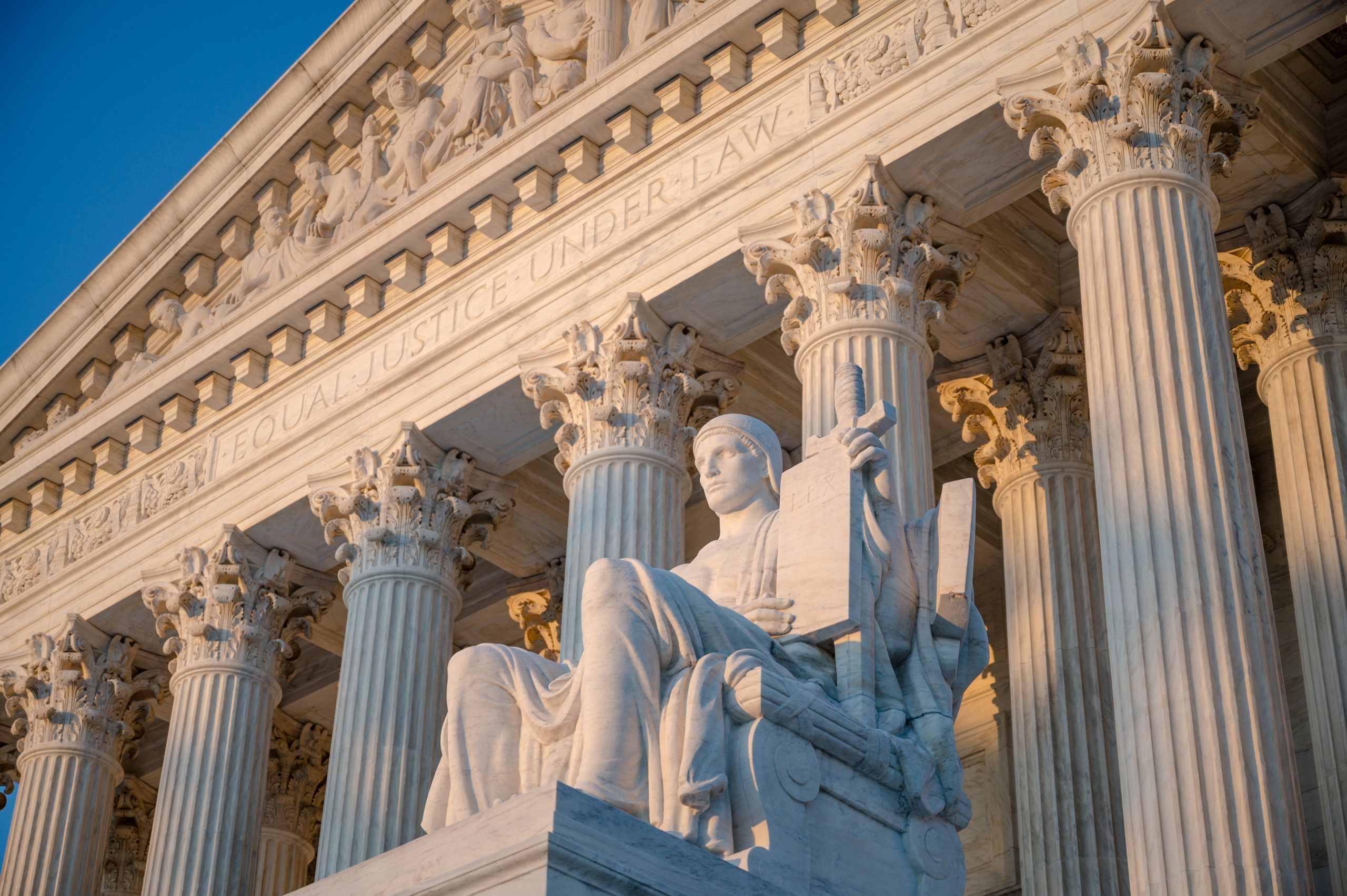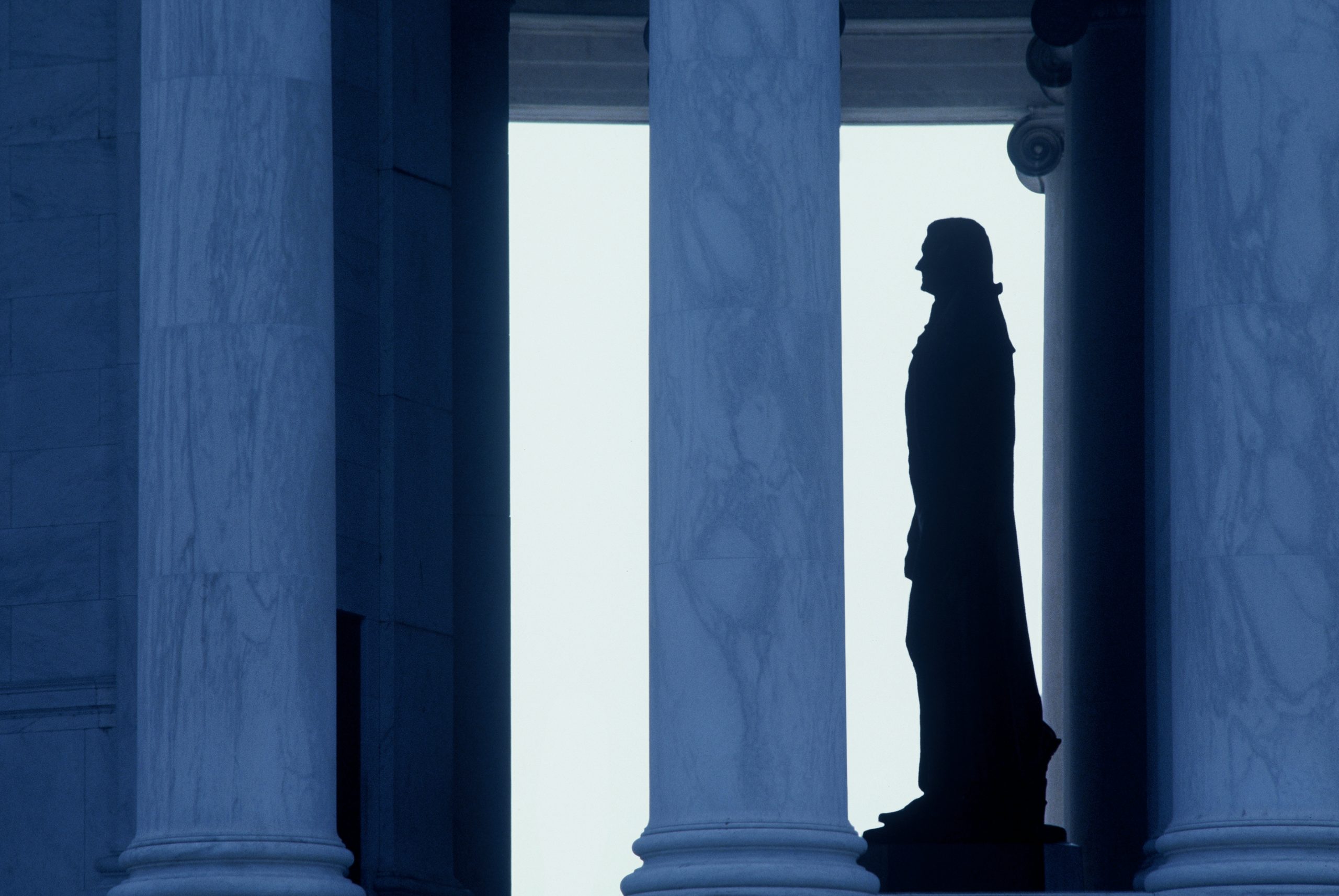At the crossroads of reason and revelation stands the American idea.
The Moral Limits of Democracy

Harry V. Jaffa rejected both the living constitution of the Progressives and the moral relativism of some conservatives.
This feature marks the publication of Claremont Institute Senior Fellow Glenn Ellmers’s new book on Jaffa’s life and thought, available for purchase here.
I am grateful for this opportunity to make a comment on the work of Harry Jaffa, and especially for the occasion that gives rise to the opportunity: the publication of an important new work on Jaffa by Glenn Ellmers. Ellmers and I overlapped one another for almost all of my years studying under Jaffa and his students in Claremont, and I can think of few who would be better positioned to write such a book—particularly when considering the access that Ellmers has had to the Jaffa archives which are now housed at Hillsdale College.
I am probably in the minority of Jaffa’s students because I did not come to know Jaffa primarily through his work on Lincoln. I certainly came to know and greatly to admire that work, but that was not really my introduction to him, nor was it the thing that most drew my attention at first. Unlike most of Jaffa’s students, I was an undergraduate at Claremont McKenna College, and came to Claremont having no idea who Harry Jaffa was, that he was even located there, or that many people came there specifically to study with him at the graduate level.
I was studying government as an undergraduate and came to have Charles Kesler as my principal teacher. At that time, Kesler was making a name for himself in academic circles by speaking to the vital role of the natural law in American politics and political thought, and I came to discover that this focus was largely influenced by Jaffa. In fact, Kesler had published a few years prior to that, while still a college student, a feature article in National Review on Jaffa’s account of the Declaration of Independence and how that was a key to understanding the first principles of the American regime. When I became interested in these questions because of Kesler, it was simply my good fortune to learn that Jaffa was in Claremont as well.
Even though I first encountered Jaffa at the very end of his formal teaching career, it was also my good fortune that he continued as a productive scholar for decades, and continued to teach both formally and informally as I moved into graduate school. Quite the opposite of a professor who retires to escape students, Jaffa would hold forth for hours at a time when we came to see him in his office, which we were invited to do regularly.
As a kind of generic policy conservative in my undergraduate days, one of the first things that fascinated me about Jaffa were his disputes with some of the icons of the conservative movement. It had never occurred to me that there might be principled differences among conservatives—or that they might share the same policy goals and support the same political candidates while diverging greatly on far deeper and more fundamental matters.
I came to know Jaffa right around the time of Robert Bork’s nomination to the Supreme Court. And while it is often forgotten that Jaffa supported Bork’s nomination, Jaffa’s subsequent attacks on Bork and others who were perceived to share Bork’s philosophy—William Rehnquist, Antonin Scalia, and Edwin Meese—earned him much infamy in conservative circles. What was the problem with these conservative legal icons?
Like Jaffa and nearly all conservatives, the conservative legal establishment was bitterly opposed to the liberal judicial activism that had dominated American jurisprudence since the Warren Court. At the heart of liberal judicial activism was a dedication to the so-called “living constitution”—the idea that there were no permanent principles to the Constitution, and that it had to be interpreted by judges to fit the ever-evolving norms of new periods of history.
The conservative legal establishment called on these liberal judges to remove themselves from this role, to stop “legislating from the bench” and to defer instead to the will of the people as expressed through their legislature and executive. Jaffa agreed with the criticism of liberal judicial activism, but he pointed out that the conservative case against it was just as relativistic and just as contrary to the actual political theory of the American founding as that of the liberals.
Rehnquist, for instance, wanted to replace the “living constitution” approach of liberal jurists like William Brennan with the “living constitution” approach of progressives like Oliver Wendell Holmes, whose attack on natural law Rehnquist cited and relied upon in his call for courts to defer to legislative majorities.
And Scalia came in for similar criticism when, in 1996, he emphatically rejected the idea—central for the American Founders—that universal moral principles could serve as a boundary for democratic rule. Scalia had written:
The whole theory of democracy is that the majority rules…. You protect minorities only because the majority determines that there are certain minority positions that deserve protection…. You cannot have democratic theory and then say, but what about the minority? The minority loses, except to the extent that the majority, in its document of government, has agreed to accord the minority rights.
Scalia’s democratic theory was, of course, very much at odds with the theory that gave rise to the American Constitution, and Jaffa took him to task for it in an article titled “Antonin Scalia, Meet James Madison and Friends.”
These criticisms of the conservative legal establishment were the way that Jaffa brought me to Lincoln. Jaffa’s own effort, during the days that I was a student, to reacquaint the conservative legal establishment with the actual principles of American constitutionalism, mirrored Lincoln’s effort to reacquaint Stephen Douglas with the very same thing. Douglas had contended that the regime ought to be indifferent as to whether slavery was voted up or down—that as long as the majority got to decide the question, that’s what our principles required. For Lincoln, of course, this was not an application of our fundamental principles, but a repudiation of them.
This was among the many issues that Jaffa brought out in his landmark work, Crisis of the House Divided. Many will be in a good position to comment on that work; I will only add, for any students reading this, that if you want to see a model for how to make your own argument stronger by making the best case for the opposing view, Crisis is the book to study. Nobody makes a fairer or more compelling case for Douglas than Jaffa does in that book, before he refutes that case with a masterly explication of Lincoln’s thought and statesmanship.
The American Mind presents a range of perspectives. Views are writers’ own and do not necessarily represent those of The Claremont Institute.
The American Mind is a publication of the Claremont Institute, a non-profit 501(c)(3) organization, dedicated to restoring the principles of the American Founding to their rightful, preeminent authority in our national life. Interested in supporting our work? Gifts to the Claremont Institute are tax-deductible.
Harry V. Jaffa's work and teaching was not enslaved to the fashions of his day.
Reflections on Harry V. Jaffa from a grateful student.
Rescuing America is the great task of this generation's best.
Harry V. Jaffa helped save American history from Progressive historicism.
Glenn Ellmers's new book on Harry V. Jaffa teaches urgent lessons for our fractious politics.






